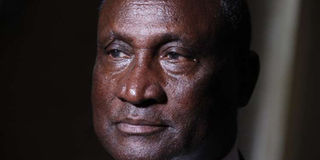The writing has been on the wall for battle-hardened Athletics Kenya trio

Suspended Athletics Kenya president Isaiah Kiplagat at a past event. PHOTO | MARTIN MUKANGU |
What you need to know:
- IAAF cracks down on Kenya’s top athletics officials
- Athletes, AK branches had sought to remove Kiplagat from office, police grilling Okeyo over graft claims
- The election of Britain’s Sir Sebastian Coe as IAAF president this year brought a wave of change with 40 Kenyan athletes being banned for doping.
The writing had been on the wall before the suspension of Athletics Kenya’s president Isaiah Kiplagat, his deputy David Okeyo and former treasurer Joseph Kinyua.
Chequered careers of Okeyo and Kiplagat in local and international athletics ran into headwinds on Monday when IAAF suspended them for six months alongside Kinyua for alleged corruption and subversion of anti-doping programme in Kenya.
The current assault on Okeyo and Kiplagat is not from 14 disgruntled chairmen of AK’s branches who tried to effect changes AK through the courts last year. Neither is it from Professional Athletes Association of Kenya (PAAK) whose members laid a siege to Riadha House last week, forcing the government to intervene.
For a long time, the writing has been on the wall for Okeyo and Kiplagat who have been the face of Kenyan athletics for decades, yet they failed to read the signs of time.
The two are alleged to have gobbled up over Sh70m from AK’s contract deal with American sportswear manufacturer Nike and are accused of subverting the campaign against doping in Kenya. Further, Kiplagat is alleged to have received a gift of two motor vehicles from Qatar Association of Athletics Federation between 2014 and 2015.
In April, Kiplagat and Okeyo were questioned by officers from the Directorate of Criminal Investigations over alleged loss of funds from Nike. It is during Kinyua’s term as AK’s treasurer that the association allegedly lost money from sponsorship deal with Nike.
The biggest threat to Kiplagat’s stay at AK headquarters in Riadha House came last year when 14 out of 16 AK branch chairmen sought his resignation a year into his fifth term of five years.
Kiplagat has managed to survive at AK, being elected unopposed for a fifth term in March 2013. In August this year, Kiplagat said he had retired and preferred one of his vice-presidents, Lt-Gen (Rtd) Jackson Tuwei, to succeed him. But he convened an executive committee meeting on November 23 to disband AK’s executive. PAAK’s siege to Riadha House however saved the day.
Former Boston and Chicago marathon champion Moses Tanui and three-time world steeplechase champion Moses Kiptanui are some of the most notable figures who have unsuccessfully sought to effect changes at Riadha House.
In September 2013 just two weeks after Team Kenya arrived from the World Athletics Championships in Moscow, the smoke screen of tranquillity at Riadha House upset when AK’s regional affiliates came out in the open to challenge Kiplagat’s authority.
Officials from 14 out of AK’s 16 regions met to demand a special general meeting. They wanted to discuss, among other issues, AK’s new constitution whose final draft they claimed had been doctored and irregular appointments at AK headquarters.
Branch chairmen, led by Southern branch Paul Mutwii, almost succeeded in toppling Kiplagat from the presidency but the ‘revolution’ failed when the case went to court.
Pressure mounted on Kiplagat last year, with PAAK accusing Kiplagat of misusing his powers and demanding his resignation. During Kiplagat’s presidency, some AK officials have been accused of taking money from athletes to cover up doping cases.
Kiplagat’s bid to become one of IAAF’s vice-presidents failed this year. He also lost his seat as IAAF council member but Okeyo returned as member of IAAF’s Cross Country Committee and was later nominated to replace Kiplagat as IAAF Council member.
The election of Britain’s Sir Sebastian Coe as IAAF president this year brought a wave of change with 40 Kenyan athletes being banned for doping.





